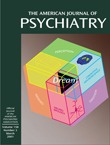Chronic Late-Onset Schizophrenia-Like Psychosis
To the Editor: In the case study by Dilip V. Jeste, M.D., et al. (1), it was noted that the patient, a 52-year-old man and the oldest of five siblings in a blue-collar family, had lost his mother because of pneumonia when she was “in her early 30s,” which means that he would have been, in all likelihood, 14 or younger when she died. Nothing is said about the immediate effect of her death on him or its subsequent influence on his life.
Given the clinically established inability to adequately mourn the loss of a parent before the end of adolescence (2), it would be most surprising if this severe psychological trauma were not a significant factor in the later development of psychosis. Is the biological approach so predominant today in psychiatry that crucial psychodynamic issues, such as the sequelae of early object loss, can either be ignored completely or not explored sufficiently in the understanding and treatment of mental illness?
1. Jeste DV, Harless KA, Palmer BW: Chronic late-onset schizophrenia-like psychosis that remitted: revisiting Newton’s psychosis? Am J Psychiatry 2000; 157:444–449Google Scholar
2. Wolfenstein M: How is mourning possible? Psychoanal Study Child 1966; 21:93–123Google Scholar



